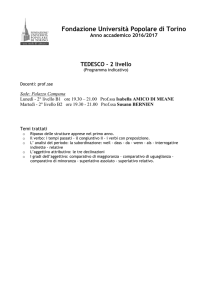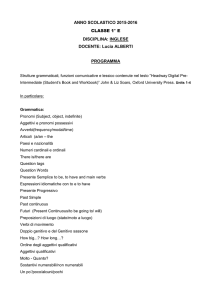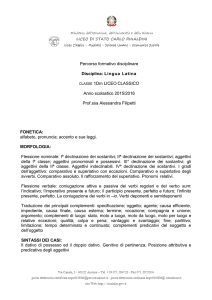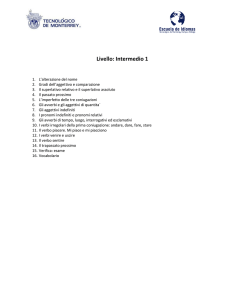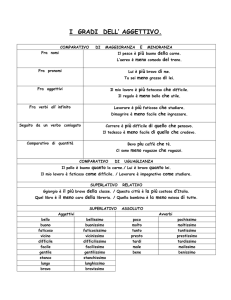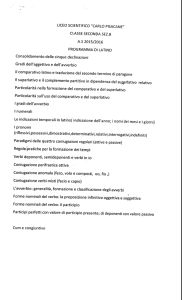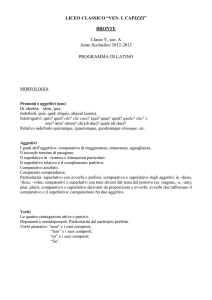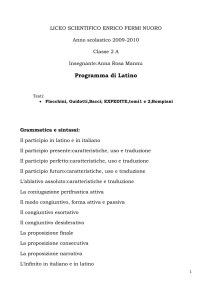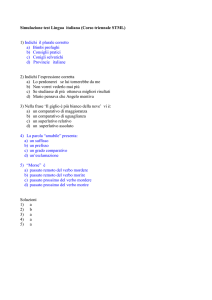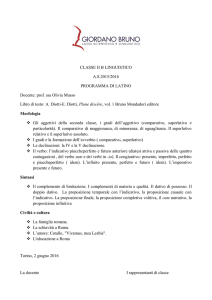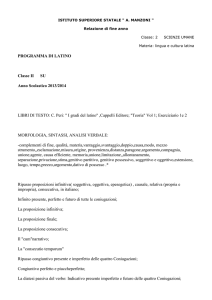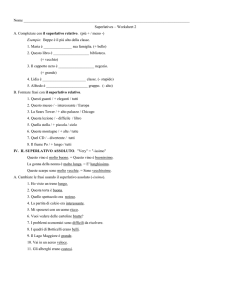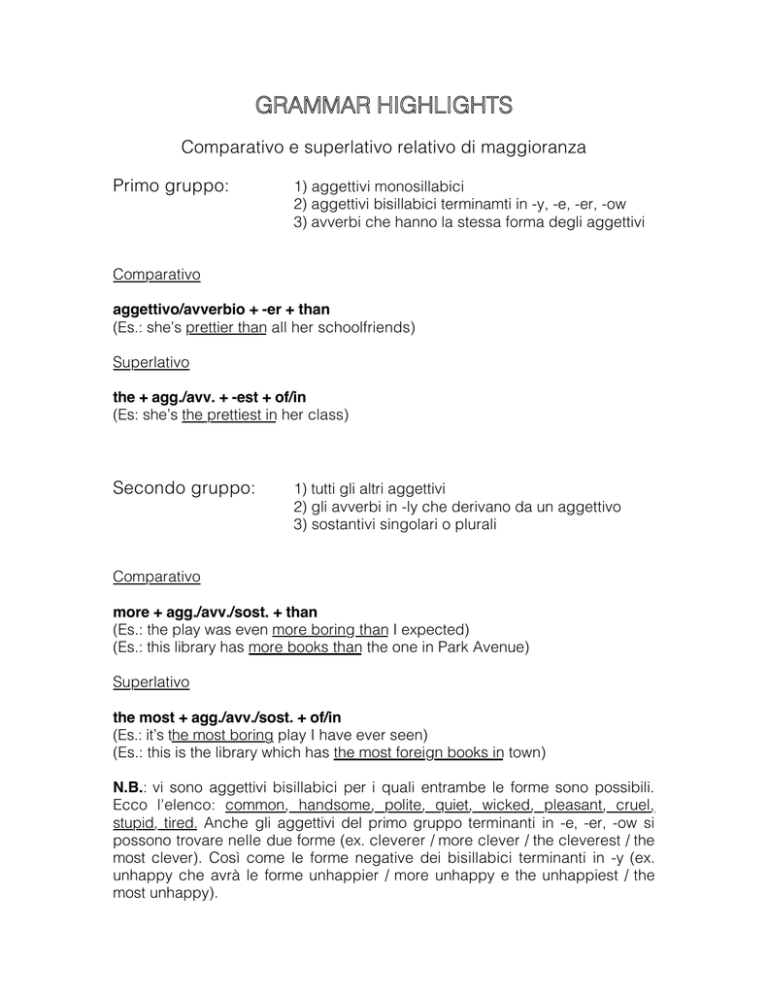
GRAMMAR HIGHLIGHTS
Comparativo e superlativo relativo di maggioranza
Primo gruppo:
1) aggettivi monosillabici
2) aggettivi bisillabici terminamti in -y, -e, -er, -ow
3) avverbi che hanno la stessa forma degli aggettivi
Comparativo
aggettivo/avverbio + -er + than
(Es.: she’s prettier than all her schoolfriends)
Superlativo
the + agg./avv. + -est + of/in
(Es: she’s the prettiest in her class)
Secondo gruppo:
1) tutti gli altri aggettivi
2) gli avverbi in -ly che derivano da un aggettivo
3) sostantivi singolari o plurali
Comparativo
more + agg./avv./sost. + than
(Es.: the play was even more boring than I expected)
(Es.: this library has more books than the one in Park Avenue)
Superlativo
the most + agg./avv./sost. + of/in
(Es.: it’s the most boring play I have ever seen)
(Es.: this is the library which has the most foreign books in town)
N.B.: vi sono aggettivi bisillabici per i quali entrambe le forme sono possibili.
Ecco l'elenco: common, handsome, polite, quiet, wicked, pleasant, cruel,
stupid, tired. Anche gli aggettivi del primo gruppo terminanti in -e, -er, -ow si
possono trovare nelle due forme (ex. cleverer / more clever / the cleverest / the
most clever). Così come le forme negative dei bisillabici terminanti in -y (ex.
unhappy che avrà le forme unhappier / more unhappy e the unhappiest / the
most unhappy).
GRAMMAR HIGHLIGHTS
Comparativo e superlativo relativo di maggioranza (parte 2)
1) E’ possibile avere la presenza di un verbo nella formazione sia del
comparativo che del superlativo. In questo caso la costruzione della frase sarà
la seguente:
Comparativo: verbo + more + than
Es.: Paul eats more than all the other members of the family
Superlativo: verbo + the most + of/in
Es.: Paul eats the most in the family
2) Gli aggettivi bisillabici terminanti in -e, -er, -ow, ammettono anche l’uso di
more/the most.
3) Alcuni aggettivi tra cui common, cruel e quiet, ammettono sia la forma in er/-est, che quella more/the most.
4) Most senza articolo ha il significati di la maggior parte di/il maggior numero
di
Es.: I like most fruit (mi piace la maggior parte della frutta).
5) Ricorda che gli aggettivi di grado comparativo e superlativo se fungono da
attributi precedono il sostantivo a cui si riferiscono.
Es.: I’ve got a smaller house than my cousin Sarah (ho una casa più piccola di
quella di mia cugina Sarah).
6) L’espressione di più riferita a tempo si rende con longer.
Es.: He wanted to stay longer, but it was impossible.
7) Il comparativo di maggioranza può essere rafforzato da:
a) much/far con aggettivi, avverbi, sostantivi singolari, verbi.
Es.: You are much thinner than me.
Es.: Lucy drinks far more tea than m e.
b) many/far con sostantivi al plurale.
Es.: France has got many more inhabitants than Spain.
8) Il superlativo è rafforzato da by far.
Es.: She’s by far the most attractive girl I’ve ever met. (E’ di gran lunga la
ragazza più attraente che io abbia mai incontrato).
GRAMMAR HIGHLIGHTS
Comparativo e superlativo di minoranza
Con: 1) aggettivi/avverbi
2) sostantivi singolari
3) verbi
Comparativo
less + ...... + than
(Es.: Bess is less optimistic than her friends)
Superlativo
the least + ...... + of/in
(Es: Bess is the least optimistic of Jane’s friends)
Con: 1) sostantivi plurali
Comparativo
fewer + sostantivo plur. + than
(Es.: I made fewer mistakes in the test than Jill)
Superlativo
the fewest + sostantivo plur. + of/in
(Es.: Bill made the fewest mistakes of all in the class)
GRAMMAR HIGHLIGHTS
Comparativo di uguaglianza
Con: 1) aggettivi/avverbi
as + aggettivo/avverbio + as
(Es.: Is he as young as him?)
Con: 1) sostantivi singolari
as + much + sostantivo sing. + as
(Es.: There isn’t as much traffic as yesterday)
Con: 1) sostantivi plurali
as + many + sostantivo plur. + as
(Es.: We don’t know as many people as you do)
Con: 1) verbi
verbo + as much + as
(Es.: I don’t smoke as much as you do)
GRAMMAR HIGHLIGHTS
Comparativi e superlativi irregolari
good
bad
old
Superlativo
better
worse
the best
the worst
older
(età anagrafica) elder
late
the oldest
the eldest
(il secondo)
later
the latter
(l’ultimo)
(ulteriore)
farther
further
the farthest
(l’ulteriore) the furthest
nearer
the nearest
the next
far
near
Comparativo
the latest
the last
GRAMMAR BOOSTER
Usa il grado comparativo per completare le seguenti frasi
1) Helen’s car isn’t very big. She wants a .................................. one.
2) My job isn’t very interesting. I want to do something .............................................
3) Your plan isn’t very good. Mine is .............................
4) I’m not very interested in history. I’m ............................................... in arts.
5) This guitar isn’t very comfortable to play. Mine is .................................................
Usa il grado superlativo per completare le seguenti frasi
1) The cobra is one of ................................................. (poisonous) snakes .......... the
world.
2) In my opinion Paris is .............................................. (romantic) cities ............ the
world.
3) Deserts are .......................... (hot) and ...................... (dry) places ......... Earth.
4) Christopher is ................................ (courageous) man I’ve ever met.
5) This is ........................ (good) market in the neighborhood and it is .....................
(cheap), too.
Riscrivi le frasi formando il comparativo o il superlativo degli aggettivi e avverbi
tra parentesi
1) He didn’t enjoy the holiday. He spent (bad) .......................... holiday of his life
there.
2) Have you listened to his (late) ............................... record?
3) Do you need any (far) ......................................... information?
4) I live (far) ........................................ from school than most of my friends.
5) She’s (good) ........................................... trumpet player in town.

